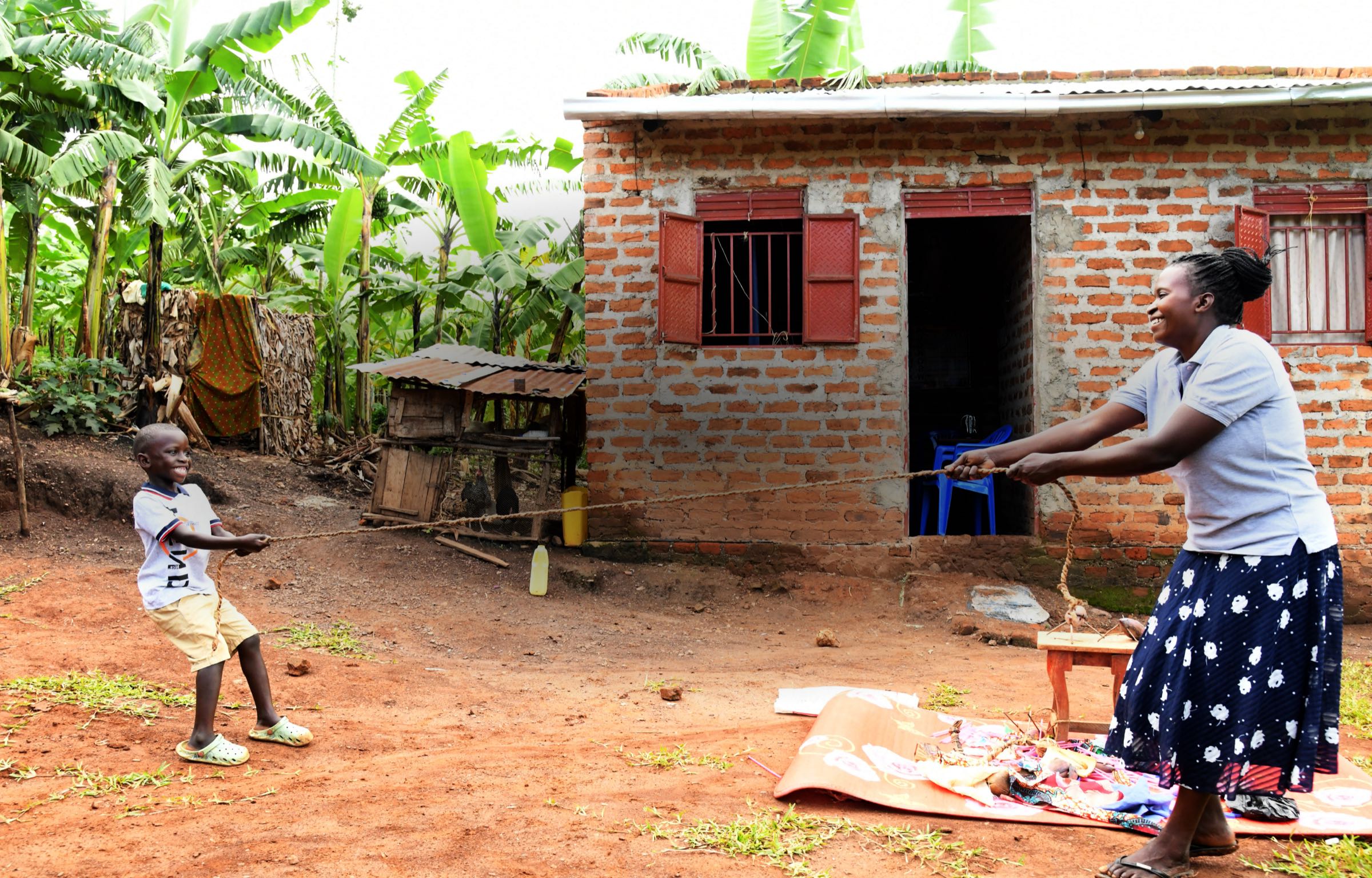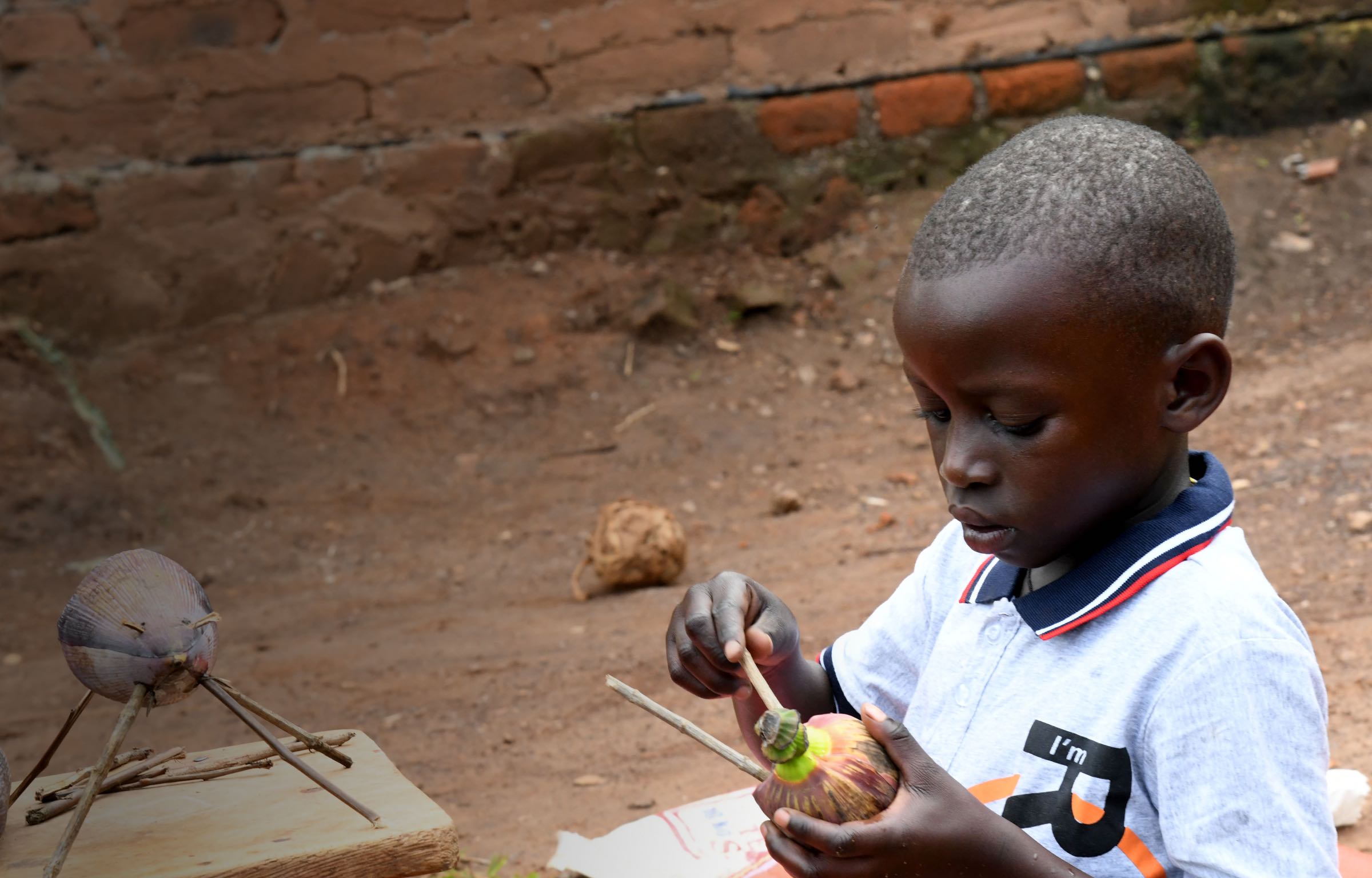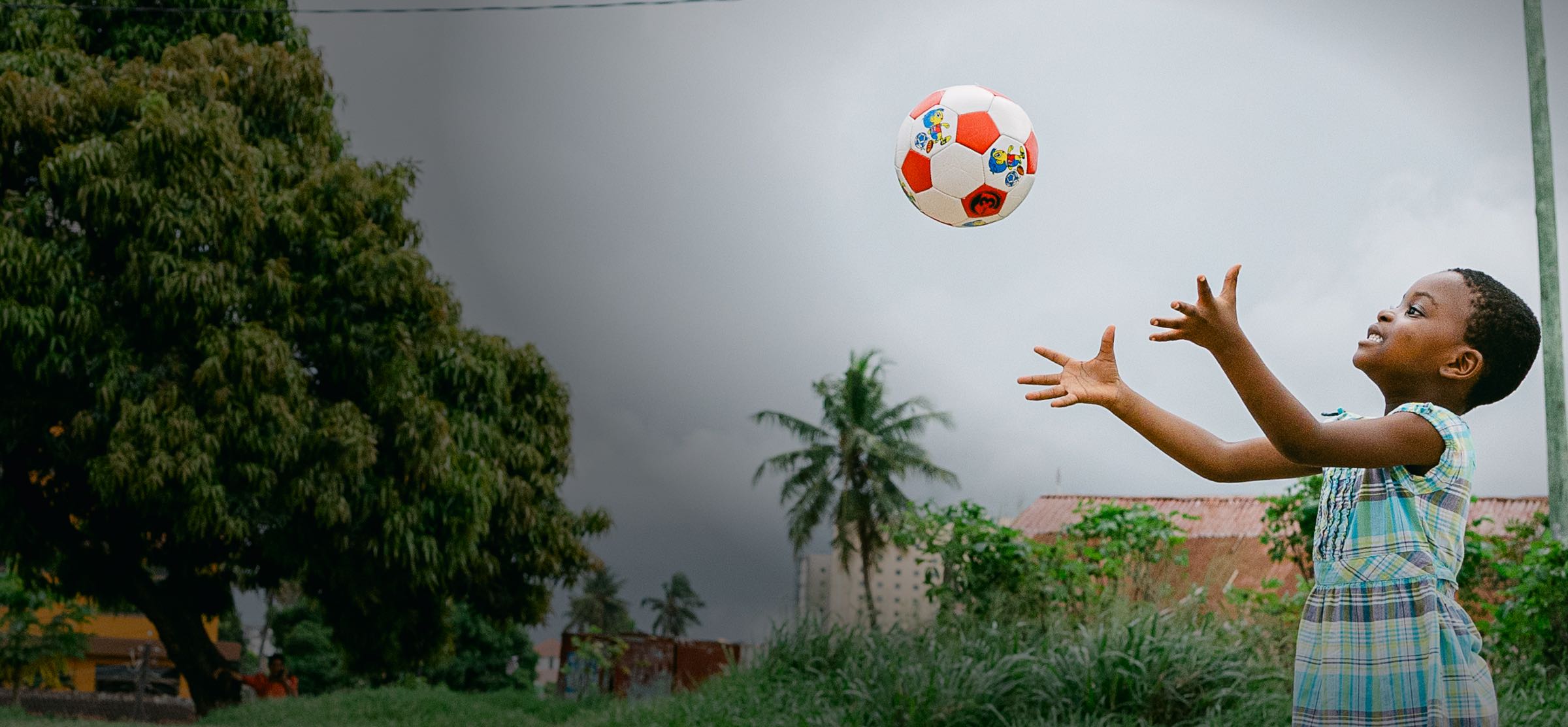Discovering the power of play
How the power of play is helping children worldwide overcome adversity
Play is a powerful tool with which to teach children
How can under-pressure parents provide a creative, supporting and playful home?
In Mabona, a small village in Isingiro district in western Uganda, 6-year-old Jerome dashes out of his home holding a ball fashioned from dry banana fibres. He builds two makeshift goalposts at both ends of the front yard out of dry cassava cuttings, drops the ball in between the goalposts and invites his mother, Liliane Ntereire, to join him in playing football.

Less than a minute into the game, Jerome outpaces Ntereire and scores. He brings the ball back to the centre of the pitch and shows his mother how she should play to score.
“You have to move the ball in a direction opposite to your goalpost,” he says.
Ntereire is allowing Jerome to show her how he wants to play. In doing so, she is encouraging him to independently explore his unique way of learning. This is a skill that Ntereire has developed which can be incredibly rewarding for her son.
The game resumes after Jerome kicks the ball in the direction of Ntereire’s goal. With one hand keeping her floral skirt away from her feet, Ntereire sprints after her lively son, trying to wrestle the ball out of his control.
A year ago, the idea of playing with Jerome seemed like a waste of time to Ntereire, as she didn’t understand the value it held in her son’s development. Now, she joins him in playing a game, one that he gets to choose independently, at their home as part of their family routine.
This change in the family home came about when Ntereire participated in the Play to Grow programme implemented in Uganda and Tanzania by Right To Play, an international non-governmental organisation that protects, educates, and empowers children to rise above adversity through the power of play.
The programme equips parents and caregivers of children aged three to six with skills and support to foster their children’s social and emotional learning and early literacy and numeracy through play. Parents learn how to build children’s self-esteem, how to reflect emotions, how to set limits, and how to support their children’s learning. This is a cause with increasing importance in these countries, where some children struggle to access schools.
“We have parents who say children used to hide from them, and that is no more,” Andrea Diaz-Varela, Global Education Specialist at Right To Play, says. “This is what this programme set out to achieve – to promote parenting approaches underpinned by love.”
Ntereire along with over 200 other parent educators in Uganda and Tanzania, were picked to deliver the programme because of their routine contact with the children and parents in their communities.
They also facilitate parent support group sessions, with the goal of promoting parent’s well-being through sharing of experiences and self-care activities to support stress management through relaxation and mindfulness. They also visit homes to see the parents and children playing together. Ntereire helps her son develop the same skills through play.
“I did not know play was this useful and I stopped my son from playing,” she says. “I thought I had other important things to do instead of playing with him.”

Our relationship has improved, and he now overcomes many challenges by opening up to me because he knows that I listen. – Liliane Ntereire
Ntereire says the programme, which was implemented in seven refugee settlements and urban communities in Uganda and Tanzania, is helping parents and children navigate complex situations. “I never used to talk much with my son, but he now tells me stories,” she says. Ntereire feels that play has not only strengthened the bond between her and her son but also increased his self-esteem. “Our relationship has improved, and he now overcomes many challenges by opening up to me because he knows that I listen,” Ntereire adds.
Play helps improve the child-parent relationship. This is supported by a recent evaluation of the Play to Grow programme that showed parents reporting positive child-parent relationships increased from 42% to 69% in Tanzania, and 70% to 84% in Uganda after this intervention. Ntereire says play is also yielding better learning outcomes for her son. “Because I let him choose the games we play, he is learning better at school,” she says. Being able to make those choices enables Ntereire’s son to build his confidence, giving him space to use his voice and agency, a key skill to nurture in his development.
As part of the programme, parents are helped to cultivate skills including but not limited to acknowledging a child’s emotions and letting them take control in playing, setting limits for behaviour, building self-esteem, and keeping daily routines for sleeping, waking up, eating, and playing. Parents are trained to make literacy, language, and numeracy skills development a playful part of everyday household activities.
The Play to Grow programme was developed at the height of the Covid-19 pandemic when families globally struggled with high stress levels and violence. To contain the pandemic, Uganda closed schools for nearly two years – the longest school closure worldwide.
“We wanted something that addressed the needs of the children and parents,” Diaz-Varela says. “Right To Play has been helping teachers use play-based learning, but we also wanted to facilitate parents with the same skills, because they are a child’s first teacher and influencer.”
The programme is based on a play therapy programme developed by the Centre for Play Therapy at the University of North Texas and merged Right to Play’s play-based approaches and expertise.
Play is essential to the development of a child. It is their first form of language: children use play to interact, learn and communicate from an early age. It contributes to their social, physical, cognitive, and emotional well-being. It also helps children develop skills that are essential for the development of academic problem-solving competencies as well as creativity.
With over 1.5 million refugees, Uganda is the largest refugee-host country in Africa and among countries hosting the biggest number of refugees globally.
Maria Altamirano, a facilitation specialist at the LEGO Foundation, which supports the Play to Grow program and learning through play programs around the world, believes play is especially important for displaced parents and children or any child dealing with trauma. “It helps the children process trauma and navigate natural disasters and conflicts,” she says. “It’s essential for mental health and wellbeing in adults, too.” Ntereire agrees, saying that playing with her child helps take stress out of her life and enhance her conflict management skills.
Mariam Mshomi, 55, a parent in Dar es Salaam, Tanzania, says the programme is building literacy and arithmetic skills in children early on.
“Public schools are not well funded and many lack play materials,” Mshomi, a kindergarten teacher at Mugabe Primary School in Dar es Salaam, says. “I take fruit toys like oranges to class and encourage children to bring along play materials. They learn better when they can see and touch these objects, and I see it in my grandchild, too. She learns the same way at home as they do in class.”

An assessment of the programme revealed that the percentage of households with play materials for children increased from 28% to 92% in Tanzania, and 47% to 73% in Uganda.
The programme also showed that social and emotional learning improved from 39% to 64% in Tanzania, and from 21% to 46% in Uganda.
Play, Altamirano says, is one of the best ways of harnessing the power of agency and facilitating children’s holistic development.
“The brain is built by play – and play is available to us all,” she adds. “Parents can lay a strong foundation for the children’s future learning by dealing with their development and educational needs through play.”
Mshomi has been a primary school teacher for over 30 years, and is parenting her five-year-old granddaughter, Marjorie. The new skills she has picked up from programmes like Play to Grow have changed how she views education. In her community, she speaks to parents about the value of play at school and public gatherings. “This is what the programme set out to achieve,” Altamirano says. “We wanted parents to build communities of their own.”
Meanwhile, Ntereire says you don’t need a lot of time to play with your child, and that all you need is knowledge about the rewards of playful parenting.
“Many of us don’t play with our children due to a lack of information about its importance and poor socioeconomic conditions,” Ntereire adds. “You can play with your child anywhere. The best way to understand why play is important is by playing.”

























































